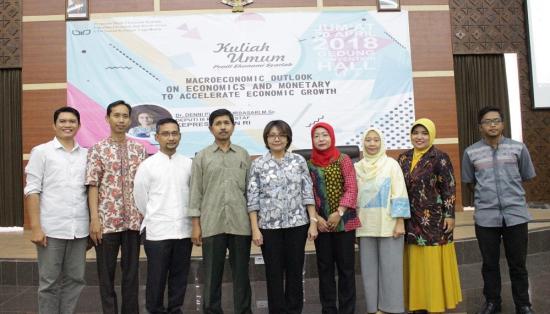Public Lecture: Challenges of Indonesia's Future Economy

The government target for medium-term economic growth is 5.5%. Given the relatively high Incremental Capital Output Ratio (ICOR) of 6.5%, the government must invest at least 36% of the GDP to achieve this target. However, the current investment stands at only around 30% of the GDP, indicating a need for an additional 6% to meet the investment requirement.
One way to address this shortfall is through borrowing, particularly foreign borrowing. Debt should not be underestimated in nation-building, but as long as the ability to repay remains within safe limits, foreign debt is not inherently negative.
This statement was made by Dr. Denni Puspa Purbasari, M.Sc., Deputy III of the Presidential Staff Office of the Republic of Indonesia, during a public lecture for the Islamic Economics Study Program, FEBI, UIN Sunan Kalijaga Yogyakarta, on Friday (20/04), held at the Convention Hall, 2nd Floor.
The event, attended by all FEBI lecturers and students, commenced with an opening address by the Vice Dean III for Student Affairs, Dr. Shofiullah Muzammil. During his presentation, Shofiyullah stated that this activity is highly beneficial and can offer advantages to students. Furthermore, he is eager to receive numerous insights regarding the development of macroeconomic policies aimed at fostering economic growth, particularly with the integration of the Islamic economic sector.
Denni Puspa, a lecturer at UGM, emphasized the necessity of patience in studying economics. As students, it is advisable not to rely on current issues as primary learning references. Instead, dedicating time to diligent study and reading economically credible books is recommended. This approach ensures that when society requires their expertise, students are well-prepared with a solid foundation of knowledge.
